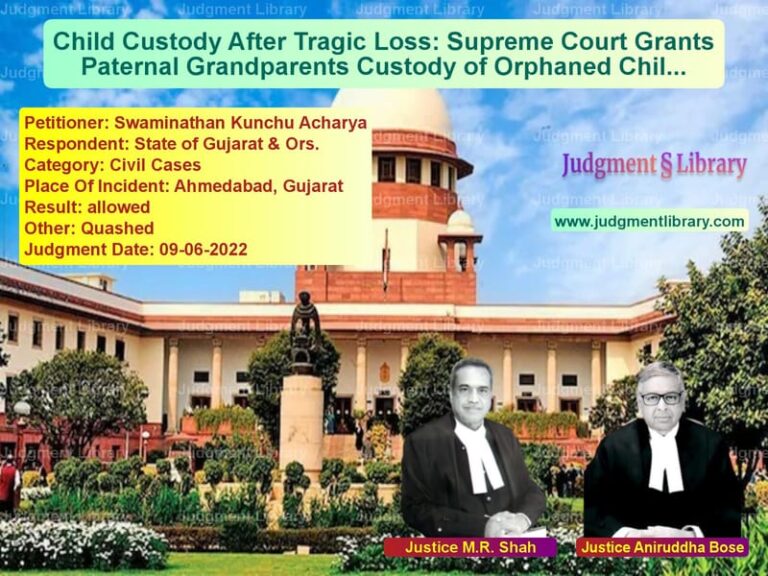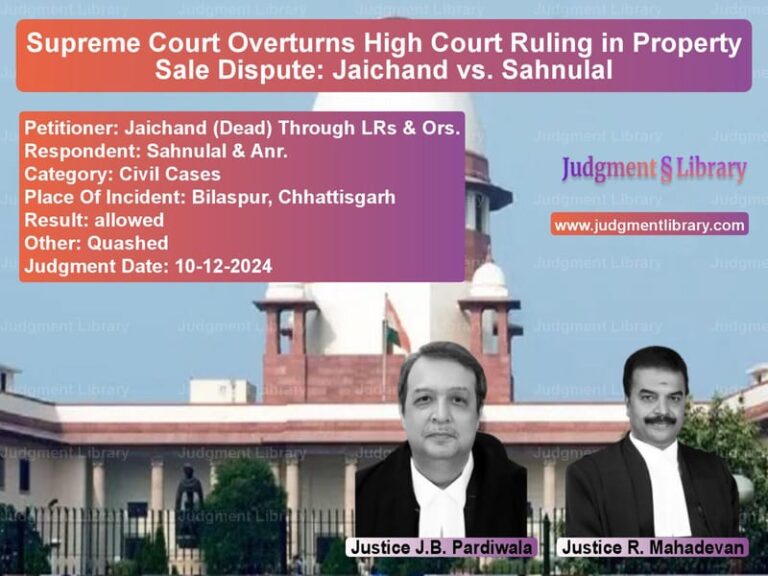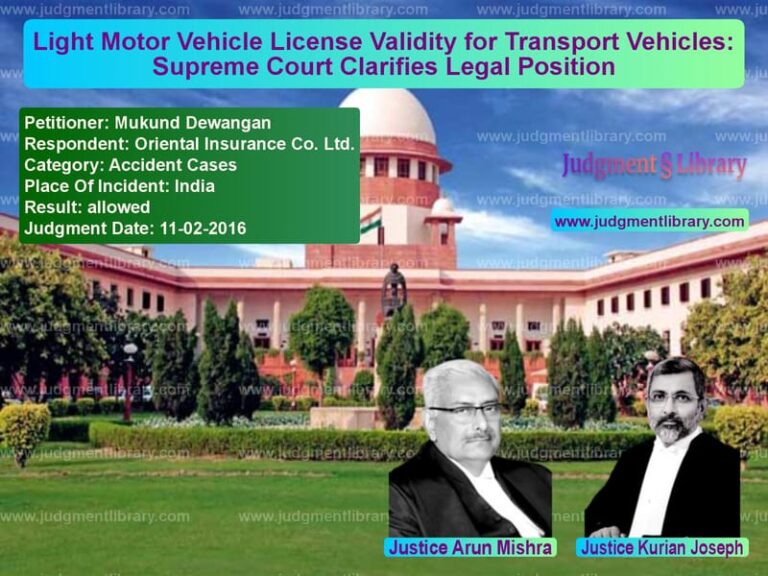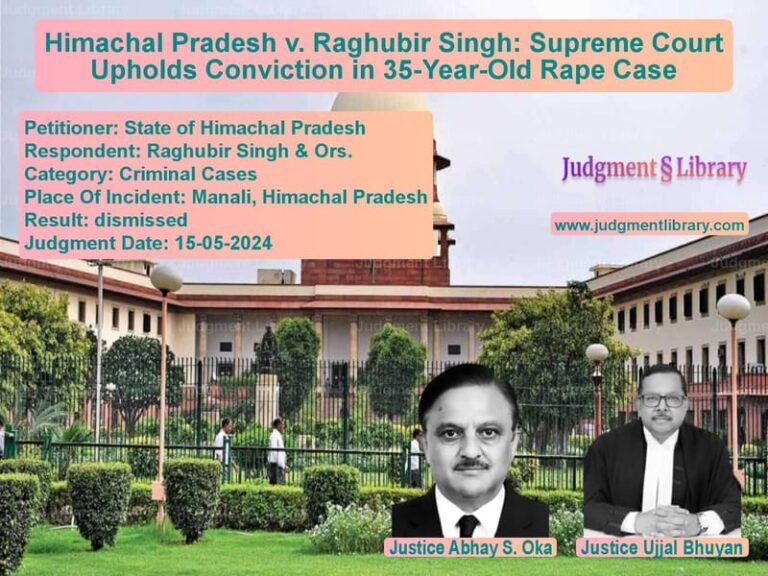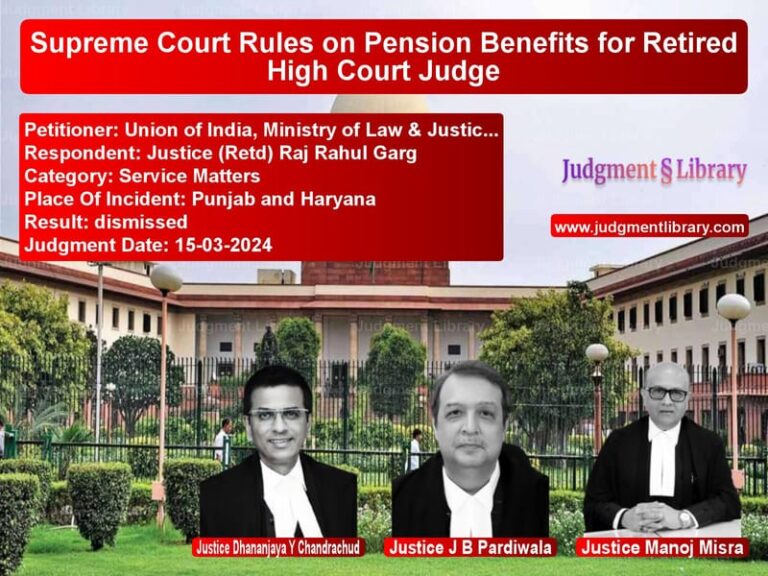Supreme Court Grants Bail in Multiple FIRs Against Real Estate Developer: Key Takeaways
The Supreme Court of India, in the case of Satinder Singh Bhasin v. Government of NCT of Delhi & Ors., dealt with multiple FIRs filed against the petitioner concerning alleged fraud in a real estate project named Grand Venice in the National Capital Region (NCR). The petitioner, a real estate developer, was accused of failing to deliver commercial and residential units to investors despite collecting funds. The case involved significant questions regarding multiple FIRs, their consolidation, and judicial intervention in criminal proceedings.
Background of the Case
The petitioner, Satinder Singh Bhasin, faced multiple FIRs registered in Uttar Pradesh and Delhi. These FIRs were lodged by investors who had booked units in the Grand Venice project but alleged that they neither received possession nor the assured lease rental/returns promised by the developer. The petitioner approached the Supreme Court under Article 32 of the Constitution, claiming a violation of his fundamental rights under Articles 14, 19(1)(d), and 21.
The key reliefs sought by the petitioner were:
- Transfer of investigation of all FIRs to the Central Bureau of Investigation (CBI).
- Consolidation of all FIRs to enable proceedings at a single forum.
- Bail in connection with the FIRs registered against him.
- Stay of proceedings in all related cases.
Arguments by the Petitioner
The petitioner contended the following:
- Multiple FIRs on the same subject matter amounted to harassment and violated his fundamental rights.
- Since many complainants had filed FIRs in both Delhi and UP, there was a clear case of duplication.
- The alleged fraud related to a single real estate project and should be investigated by a single agency rather than multiple law enforcement units.
- The petitioner had already obtained completion and occupancy certificates for the project, and many investors had refused to take possession despite availability.
- Several cases regarding the same project were already pending before consumer courts and the National Company Law Tribunal (NCLT).
Arguments by the Respondents
The prosecution, representing the State of Uttar Pradesh and the Government of NCT of Delhi, made the following counterarguments:
- The FIRs were not identical but involved separate individuals who had invested money in the project.
- The petitioner had collected funds from multiple buyers and failed to deliver possession or provide returns as promised.
- Several cases involved allegations of financial mismanagement, misrepresentation, and criminal breach of trust.
- The investigation in UP was already being conducted by a Special Investigation Team (SIT), and there was no need for a CBI inquiry.
- Any attempt to consolidate FIRs across states would interfere with the federal structure of law enforcement.
Key Observations by the Supreme Court
1. No Need for CBI Investigation
The Court rejected the plea for a CBI probe, stating that the investigation was already being handled by the SIT in UP and concerned police units in Delhi. The Court held that unless there were compelling reasons, ongoing investigations by state agencies should not be transferred to CBI.
2. Consolidation of FIRs Not Warranted
The Court refused to consolidate all FIRs, citing that each case involved distinct investors who had suffered individual losses. However, the Court acknowledged that similar allegations in different states could lead to procedural challenges.
3. Grant of Bail in All FIRs
The Court granted interim bail to the petitioner in all FIRs related to the Grand Venice project, with certain conditions:
- The petitioner must not commit any further offenses of a similar nature.
- The petitioner must not threaten or influence witnesses.
- The petitioner must report weekly to the investigating officer.
- The petitioner must deposit ₹50 crore with the Supreme Court registry.
- The petitioner must surrender his passport.
4. Stay on Proceedings in Delhi FIRs
The Supreme Court ordered a stay on proceedings arising from FIRs registered in Delhi. However, the Court allowed complainants in Delhi to approach UP’s SIT for further investigation.
Conclusion
The Supreme Court’s ruling in this case reinforces the principles of fair investigation and prevention of multiplicity of proceedings. While the Court refused to consolidate the FIRs or transfer them to CBI, it provided the petitioner relief by granting bail across all cases and ensuring that investigations were conducted in a streamlined manner.
This judgment is significant for real estate developers and investors, highlighting how disputes involving multiple complaints can lead to complex legal proceedings across jurisdictions. The decision also sets a precedent on the handling of multiple FIRs and judicial oversight in large-scale financial fraud cases.
Petitioner Name: Satinder Singh Bhasin.Respondent Name: Government of NCT of Delhi & Ors..Judgment By: Justice A.M. Khanwilkar, Justice Dinesh Maheshwari.Place Of Incident: National Capital Region (NCR), India.Judgment Date: 13-11-2019.
Don’t miss out on the full details! Download the complete judgment in PDF format below and gain valuable insights instantly!
Download Judgment: Satinder Singh Bhasi vs Government of NCT of Supreme Court of India Judgment Dated 13-11-2019.pdf
Direct Downlaod Judgment: Direct downlaod this Judgment
See all petitions in Fraud and Forgery
See all petitions in Bail and Anticipatory Bail
See all petitions in Extortion and Blackmail
See all petitions in Money Laundering Cases
See all petitions in Attempt to Murder Cases
See all petitions in Judgment by A M Khanwilkar
See all petitions in Judgment by Dinesh Maheshwari
See all petitions in partially allowed
See all petitions in Stayed
See all petitions in supreme court of India judgments November 2019
See all petitions in 2019 judgments
See all posts in Criminal Cases Category
See all allowed petitions in Criminal Cases Category
See all Dismissed petitions in Criminal Cases Category
See all partially allowed petitions in Criminal Cases Category


